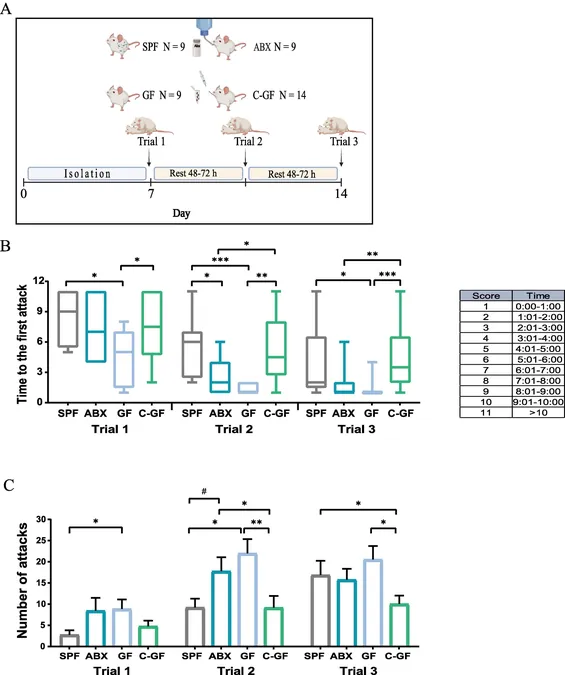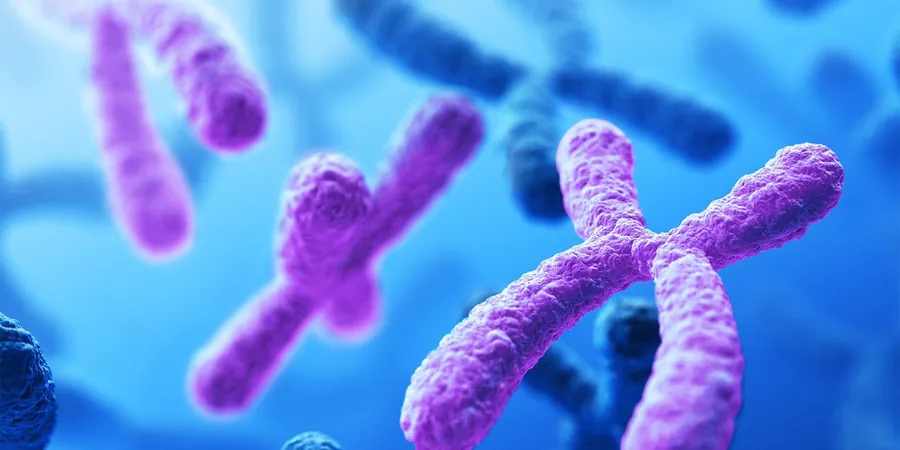
Shocking Study Links Gut Bacteria to Aggression in Mice – What It Means for Humans!
2024-09-23
Author: Li
Introduction
A groundbreaking study conducted by Prof. Omry Koren and graduate student Atara Uzan-Yuzari at Bar-Ilan University's Azrieli Faculty of Medicine has unveiled a startling connection between the gut microbiome and aggressive behavior in mice. This research, recently published in the respected journal Brain, Behavior, and Immunity, sheds new light on how disturbances in gut bacteria—especially those caused by antibiotic treatments in early life—can escalate aggressive tendencies.
Previous Research
Building on earlier studies that suggested a relationship between antibiotic exposure and heightened aggression in fruit flies, the researchers took a bold leap forward by employing a mouse model. They meticulously examined various behavioral, biochemical, and neurological changes resulting from microbiome alterations, providing a deeper understanding of this phenomenon in mammals.
Research Methodology
As part of the study, the researchers transplanted gut microbiomes from infants who had received antibiotics shortly after birth into their mouse subjects. The results were striking: the mice with "antibiotic-disrupted" microbiomes exhibited significantly increased aggression compared to those receiving microbiomes from infants who had not been exposed to antibiotics.
Key Findings
"This research is a game changer," exclaimed Prof. Koren. "Our findings strongly indicate that a disrupted microbiome during critical developmental windows has the potential to induce persistent aggression in the creatures later in life." The assessment of aggression was conducted using the resident-intruder paradigm, a widely recognized method in behavioral studies where a strange mouse is introduced into the home territory of a resident mouse. The results provided compelling evidence linking lower diversity in gut bacteria—stemming from antibiotic treatments—to elevated aggression levels. Furthermore, there were notable changes in metabolites and gene expressions associated with aggression in the mice's brains.
Innovative Approaches
Perhaps most intriguingly, the study employed "humanized" mice, which were implanted with human intestinal bacteria to enhance the relevance of the findings for human health. This pioneering approach offers valuable insights into how early-life antibiotic exposure might influence future social behaviors in humans.
Biochemical Insights
The research team delved into the biochemical underpinnings behind these behavioral changes, measuring neurotransmitter levels such as serotonin and tryptophan in the mice's brains. A remarkable pattern of gene expression was observed in several brain regions, with the septum identified as a critical area involved in aggression regulation.
Implications for Human Health
As scientists continue to unravel the intricacies of the microbiome, this study raises compelling questions about the potential implications for human health. Could the rise in antibiotic use during infancy contribute to increased aggression and behavioral issues later in life? This research underscores the urgent need to reevaluate our approach to antibiotic prescriptions, especially in young children.
Conclusion
Stay tuned as this fascinating field of study continues to evolve, potentially transforming how we understand the connections between our microbes and our behavior!






 Brasil (PT)
Brasil (PT)
 Canada (EN)
Canada (EN)
 Chile (ES)
Chile (ES)
 Česko (CS)
Česko (CS)
 대한민국 (KO)
대한민국 (KO)
 España (ES)
España (ES)
 France (FR)
France (FR)
 Hong Kong (EN)
Hong Kong (EN)
 Italia (IT)
Italia (IT)
 日本 (JA)
日本 (JA)
 Magyarország (HU)
Magyarország (HU)
 Norge (NO)
Norge (NO)
 Polska (PL)
Polska (PL)
 Schweiz (DE)
Schweiz (DE)
 Singapore (EN)
Singapore (EN)
 Sverige (SV)
Sverige (SV)
 Suomi (FI)
Suomi (FI)
 Türkiye (TR)
Türkiye (TR)
 الإمارات العربية المتحدة (AR)
الإمارات العربية المتحدة (AR)